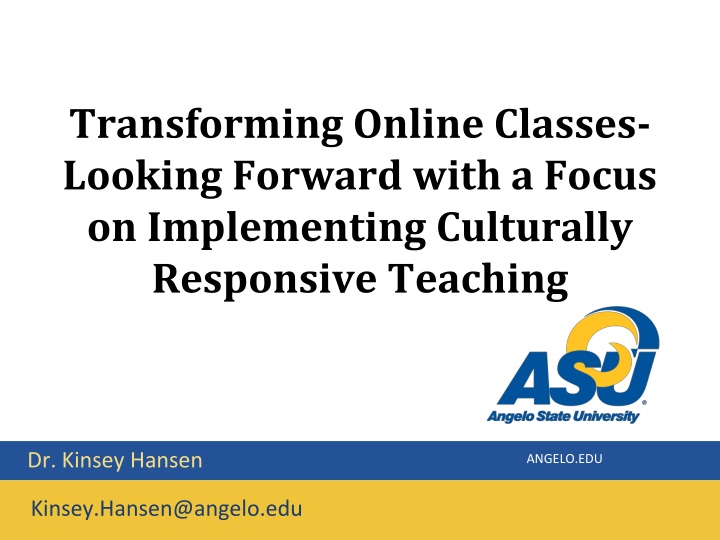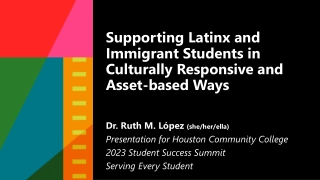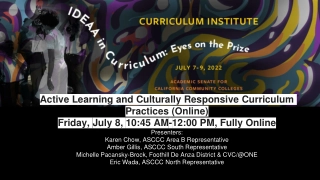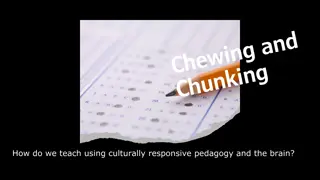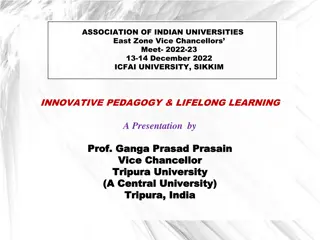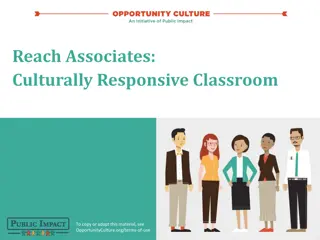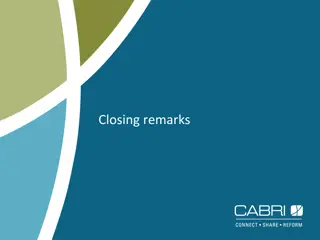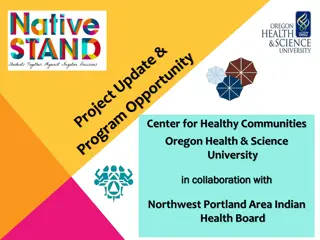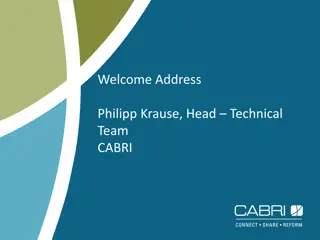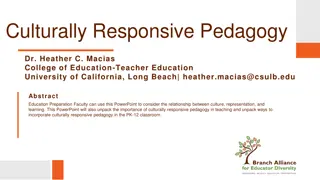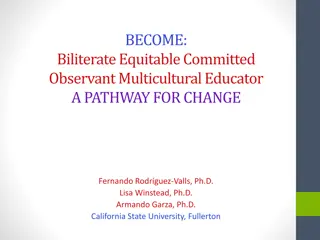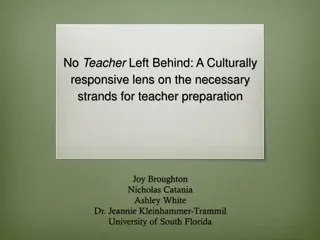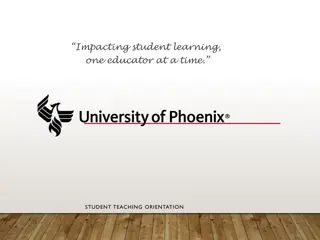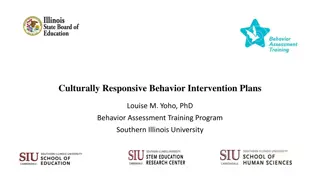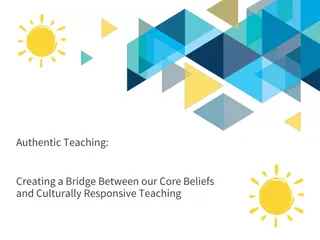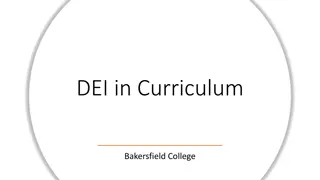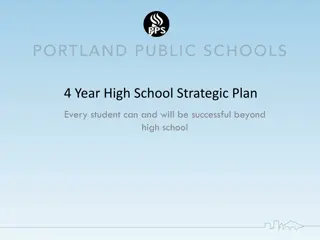Culturally Responsive Teaching & Student Relatedness in Online Education
Explore the significance of culturally relevant pedagogy and student relatedness in online classes, focusing on fostering supportive relationships for academic success. Learn ways to implement activities that build a sense of relatedness and intrinsic motivation, enhancing student engagement and learning outcomes in virtual learning environments.
Download Presentation

Please find below an Image/Link to download the presentation.
The content on the website is provided AS IS for your information and personal use only. It may not be sold, licensed, or shared on other websites without obtaining consent from the author.If you encounter any issues during the download, it is possible that the publisher has removed the file from their server.
You are allowed to download the files provided on this website for personal or commercial use, subject to the condition that they are used lawfully. All files are the property of their respective owners.
The content on the website is provided AS IS for your information and personal use only. It may not be sold, licensed, or shared on other websites without obtaining consent from the author.
E N D
Presentation Transcript
ANGELO.EDU Transforming Online Classes- Looking Forward with a Focus on Implementing Culturally Responsive Teaching Dr. Kinsey Hansen ANGELO.EDU Kinsey.Hansen@angelo.edu
ANGELO.EDU Learning Objectives Examine the importance of culturally relevant pedagogy Evaluate the role of student relatedness Identify and discuss ways to implement activities that build sense of relatedness in an online class
ANGELO.EDU Importance of Culturally Relevant Pedagogy Bridging cultural gaps to develop academically validating relationships Relatedness - "Fostering supportive and positive relationships between professor, students, and rigorous content (Salazar & Berryhill, 2020, p. 46).
ANGELO.EDU Significance of Relatedness Relatedness is fundamental to developing intrinsic motivation and persisting in difficult tasks (Deci & Ryan, 1985). Student-peer relationships contribute to self-sustaining engagement in high-quality learning, characterized by focused hard work, constructive responses to challenges and setbacks, and resilience (Skinner & Pitzer). Learning communities improve learning outcomes and relatedness to faculty and peers is a strong predictor of academic development and student preparedness (Beachboard et al. 2011). Deci & Ryan (1985)
ANGELO.EDU Student Relatedness & Peer Review Benefits of Peer Review Student-to-student interactions are positively related to general learning, cognition, racial identity, academic self-identity, well being, moral, retention. Peer-to-peer relationships keep students-especially marginalized students-from letting each other fail. Purposeful peer interaction enhances learning, increases sense of belonging, and improves student confidence. (Felton & Lambert, 2020)
ANGELO.EDU Group Activity
ANGELO.EDU Peer Review - Background Course Information Course: EDG 6340 - Structure and Organization Who Takes this Course: Master s level course in the department of Curriculum & Instruction Administrative Leadership majors Course is taken at any point in the degree 8 week term; 100% online
ANGELO.EDU Peer Review Project Part Two: Design/Include Engagement Activity Part One: Construct Professional Development on Four Frames What feedback can you provide the presenter regarding the activity? What recommendations do you have for improvement? What points did you expect the presenter to cover regarding each frame?
ANGELO.EDU Lessons Learned Students loved peer review in this course Benefits of peer review from this course specifically Students gained new perspectives Peer review improved students assignments Received beneficial feedback Increased clarification on assignment Provide a second set of objective eyes on assignment
ANGELO.EDU Course Survey Results Course survey included 7 questions Survey addressed peer review on presentation and activity component of project Responses received = 9 Qualitative and quantitative data received
ANGELO.EDU Question 1 and 2
ANGELO.EDU Question 3.
ANGELO.EDU 4. What (if anything) about the Peer Review process was beneficial? (Please explain) I was able to see my peer's work and relate it to mine. I was able to see how my peer's reflection of the 4 frames was different or similar to my personal reflection. I gained different perspectives that I hadn't thought of. Viewing others take on the assignment and receiving feedback to help my assignment improve. Seeing what other people thought about your presentation before you submit. It provides you the ability to make changes before submitting for the final grade. Being able to have a "sounding board" to bounce ideas off of has been integral to my success in this program. Peer review assignments are one of my favorite ways to get feedback. I found the Peer Review beneficial to listen to other perspectives and additional feedback to strengthen my presentation. I had over-complicated this presentation in a big way. In fact I wasted several hours overcomplicating this presentation. Thank goodness for the peer review process which helped me clarify what was needed for this assignment. It gave me a chance to have someone other than a "loving non-critical" family member review my work.
ANGELO.EDU 5. What (if anything) about the Peer Review process was ineffective? (Please explain) Technology The technology part of it seemed to be a bit of an issue, but it was resolved quickly. (2 students): Short answers Lack of detailed feedback (2 students) Nothing (3 students)
ANGELO.EDU 6. As a peer reviewer I learned.... A different view or perspective about the course. I was able to see how my peer's viewed leadership in their organization. That other individuals ideas may compliment my work and allow for me to expand my ideas. I learned to be open minded and how to consider suggestions and/or constructive criticism. Someone always has a better presentation than you! I also learned to provide construct, thoughtful, and useful feedback. How to provide feedback for others and get glimpses of what I was doing well, or not, on my assignment based upon seeing others in the class. It made be aware of other people s way of thinking when they made their own presentation. It also provided more information to add in my own work. I learned that there are several ways to accomplish the same task. We all need help. How difficult it is to be as helpful as possible. I really wanted my people to do their best and it was a big responsibility to give them as much feedback as possible. How to better improve my own work
ANGELO.EDU 7. Would you recommend Peer Review in future courses? Why? Yes, because it allows others to see their peer's work and learn from it in a way that can be beneficial to them. It is also reassuring that you have similarities in your work when it comes to not being confident in your work or assignments. Yes because it allows students to receive feedback from others. This can help the student gain a better understanding on how others think. The review was short, sweet, and to the point. It also allows students to become open minded. Yes, it's beneficial if done right. Absolutely!! Please see above. Yes, this makes me think critically when looking at others work and will make me want to apply more work into my own presentation. Yes I definitely recommend the peer review process. It's a great way to get feedback before submitting the assignment for a grade. Absolutely! Yes I would. Just like any group project, you always run the risk of having someone not do their part. However, since there is two people doing your reviews, it is possible to get good feedback and it is very helpful to see it from the other side as a reviewer. Yes, it allows you to get a better understanding of the expectations
ANGELO.EDU Future Improvements to Peer Review Technology Requirement for Peer Review Responses Enhance peer review criteria Increase minimum word requirements Reword directions Increase points associated with Peer Review
ANGELO.EDU Looking Forward Include student relatedness in each course (integrate a focus on instructional materials and instructor-peer) Diversify each student relatedness approach in each course Peer Review Group Project Pilot Weekly Small Group Tasks What are you currently doing in your online courses that incorporates student relatedness with a focus on peer to peer relatedness?
ANGELO.EDU References Fedesco, H.N., Bonem, E.M., Wang, C., & Henares, R. (2019). Connections in the classroom: Separating the effects of instructor and peer relatedness in the basic needs satisfaction scale. Motivation & Emotion, 43(5), 758- 770. Doi: 10.1007/s11031-019-09765-x. Nicol, D., Serbati, A., & Tracchi, M. (2019). Competence Development and Portfolios: Promoting Reflection through Peer Review. AISHE-J: The All Ireland Journal of Teaching & Learning in Higher Education, 11(2), 1 13. Peter Felten, & Leo M. Lambert. (2020). Relationship-Rich Education: How Human Connections Drive Success in College. Johns Hopkins University Press.
